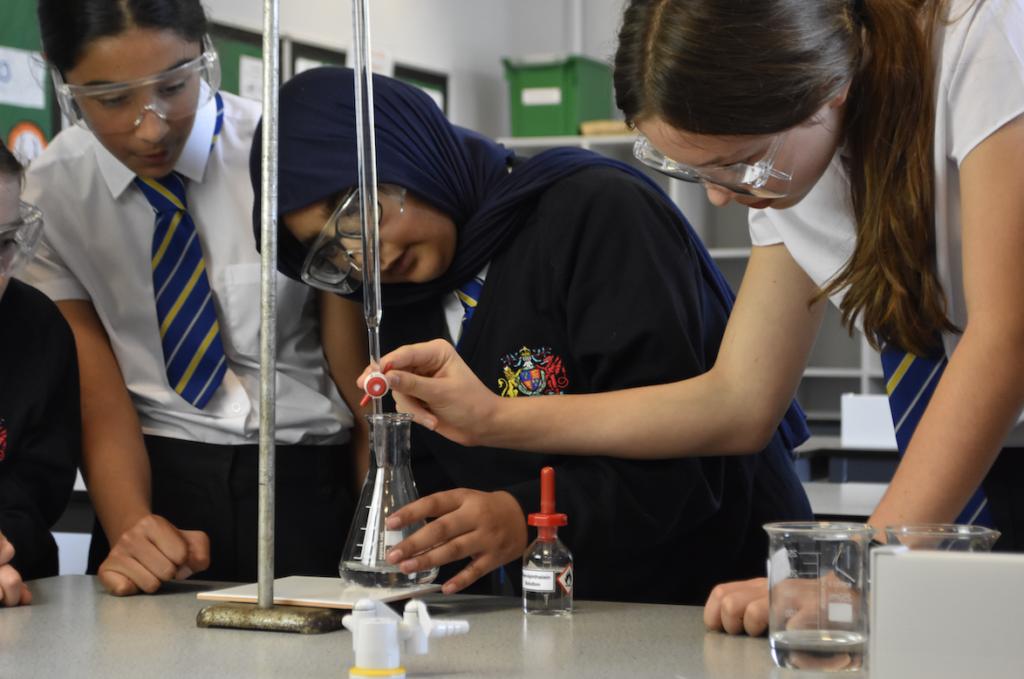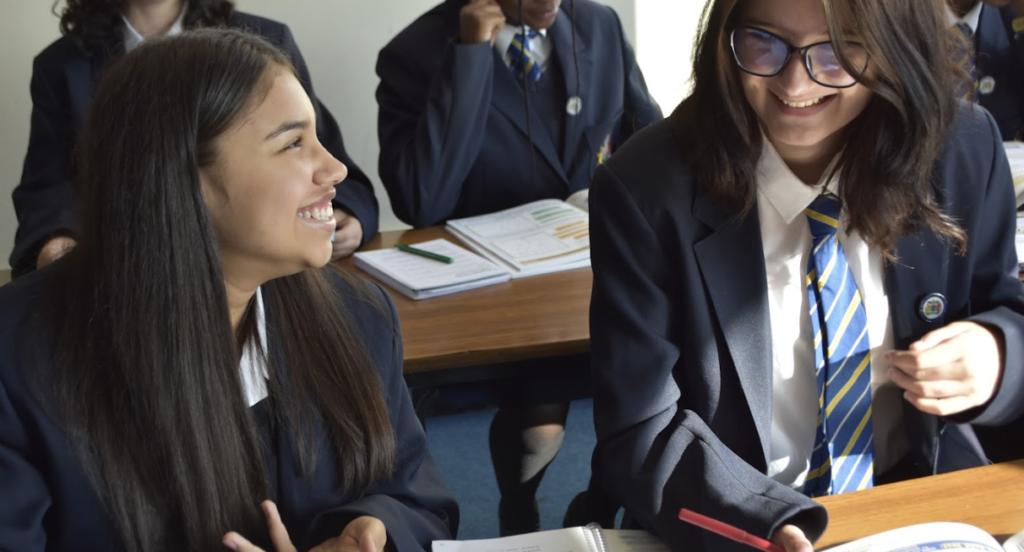By the end of Key Stage 3 students will have covered how to to apply the following in a performance:
Voice– Volume, clarity, tone, pace, pause, pitch, intonation, emphasis, accent/dialect and using dialogue.
Movement -Facing the audience, gesture, facial expression, levels, proxemics, positioning on stage, posture, interaction, eye contact and using stage directions.
Drama techniques – Role-play, still-image, thought tracking, hot seating, mime, role on the wall, cross cutting, direct address, conscience alley, units and objectives, character motivation exercises, devising, improvising, forum theatre, and naturalistic and non-naturalistic performance techniques.
Staging – The positions of the stage, creating atmosphere, using proxemics and levels, realising artistic intentions, exploring historical, cultural and social context, elements of costume and set design.
Roles – Actor, director, playwright, designer, producer, stage manager.
Year 7
Autumn Term
‘Harry Potter and the Cursed Child’ Design and Script.
Students will begin to learn script conventions and be able to understand how design plays a part in the creation of theatre.
This term will focus on the introduction of the first vocal and movement skills in performance, being able to stay in role and maintain focus, face the audience and use volume. We will also learn the different areas of the stage and acting spaces to help students develop their performance skills.
We will explore how costumes can enhance a performance and try creating designs for key characters.
Spring Term
Silent Film: Theatre History and stage craft.
Students explore the key elements of mime and comedy; whilst being introduced to the origins of silent film acting. Students will explore the rules of mime and apply these whilst planning their own storylines and using the green screen to record their own silent films. This scheme enables students to become playwrights, directors, producers and performers, exploring the responsibilities of the different roles, whilst developing their resilience.
Summer Term
‘Hood’ Script and performance
Students develop their understanding of script work from the Autumn term taking more ownership in their acting skills. The play tackles the themes of modern day poverty, relationships and family breakdown. Students are encouraged to ask the question, ‘What is right?’ The students will use a combination of script and forum theatre to challenge and question how society treats its vulnerable. The final assessment in Year 7 will introduce students to the idea of character motivation and how to use this to interpret a character for an audience.
Year 8
Autumn Term
‘Noughts and Crosses’ Script and Stage craft.
Students explore how a novel can be adapted for the stage. Exploring the themes of division, prejudice and racism through cross cutting and monologue, students will rehearse and perform their own interpretations inspired by the playwright’s intentions. Students will revisit all of the vocal and movement elements explored in Year 7 and continue to build the layers of these in performance.
Spring Term
‘Macbeth’Design and Theatre History.
Students are able to delve deeper into this fascinating story by manipulating light, set and costume to create tension and atmosphere for an audience. This scheme focuses on submerging an audience into a truly memorable experience learning how to use special effects to enhance meaning in a scene. Students will use soliloquy to explore the technique of direct address in performance. This work supports the teaching of Macbeth in GCSE English.
Summer Term
‘Anita and Me’ Devising and diversity.
Set in the Black Country during the 1970’s, the play ‘Anita and Me’ is used as a stimulus to create work that relates to the history of the West Midlands. Students will explore friendship, cultural diversity and adolescence through the rehearsal technique of conscience alley. Practical work will focus on the use of the stage space and proxemics to show the relationships between characters and the importance of staging in a final performance.
Year 9
Autumn Term
‘The Woman in Black’ Design and Directing.
This gothic horror playtext, set in the Edwardian Era, follows Jennet Humphries’ revenge on the small town of Crythin Gifford. Based upon Susan Hill’s novel, it is the second longest running play in London’s West End and students will explore what makes a successful show. In practical work they explore and evaluate how the design elements and direction of the two actors (who multirole all the characters) can lead to an exciting performance for an audience. Students will study the cultural and social aspects that help to build a play and begin to use non-naturalistic elements to create atmosphere and tell a story.
Spring Term
‘Girls Like That’ Script writing.
Students will use the issue of social media sexting to perform a scene from the play. During this scheme, students will develop accurate characterisation, non-naturalistic chorus work, and begin to work as an ensemble. They will also understand the importance of learning lines for a sustained performance. The rehearsal process will be more autonomous and lead to students applying both the playwright’s and their own artistic intentions to a scene.
Summer Term
‘Circles’ Character motivation and Acting.
‘Circles’ is a naturalistic play set in Birmingham on the number 11 bus. Students will learn how to sympathetically write a script, influenced by the theme of gang related crime. Students will learn how to apply Stanislavski’s units and objectives to their own scripts, thinking about character motivation and how to portray a realistic character in performance. As their final KS3 assessment this is the culmination of all of the knowledge and skills gained to create a piece of theatre and perform confidently in front of an audience of their peers.
Assessment at Key stage 3
Assessment is continuous and will include low stakes and high stakes tests in order to promote independent learning. Teachers give live verbal feedback which students record and then use to help them progress in subsequent lessons.
The baseline assessment in Year 7 will see what students already know and can do and will highlight any high potential students and they will be monitored throughout the year.
At the interim of each topic students will complete a short knowledge test to ascertain what knowledge has been learnt.
At the end of each scheme (term) students take part in final assessment which is either design or performance based.
Students receive homework tasks when appropriate to reinforce knowledge, which may involve learning lines and key vocabulary, rehearsal, self-reflection, research, extended writing and examination theory questions.
How can parents help support their child’s learning?
Students who wish to improve their skills or confidence may join lunchtime clubs in order to support their further development.
Students should ensure they have joined the google class and that homework is completed. This may include offering access to the internet or trips to the library where possible. Remember students can use the school library and computers at lunchtime.
Encourage your daughter to participate in extra-curricular activities including theatre visits where possible.
Attend performances where possible outside of school to broaden students’ understanding of the performing arts.
BBC Bitesize is a good starting point.
https://www.bbc.co.uk/bitesize/subjects/zk6pyrd
The National theatre online
https://www.ntathome.com/
Enrichment opportunities
The department runs Drama clubs for KS3 students at lunchtimes. Students are invited to audition for the whole school production that takes place in the Summer term.
There may be opportunities to secure theatre tickets for shows at the Hippodrome at reduced rates.
Throughout the year there are projects run by the Birmingham Hippodrome that students can participate in. We have just begun the Arts Ambassador programme to promote Arts across the school.
![]()



